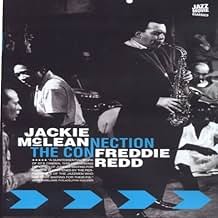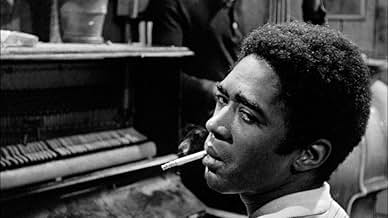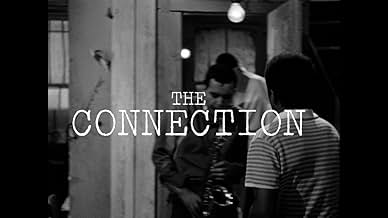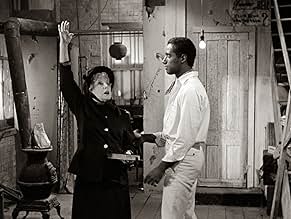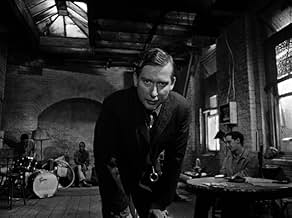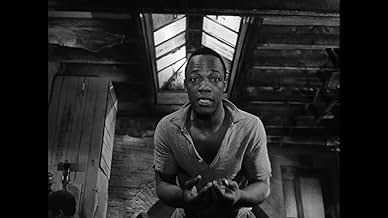IMDb RATING
7.0/10
1.1K
YOUR RATING
Men sent their own way await heroin in Leach's apartment.Men sent their own way await heroin in Leach's apartment.Men sent their own way await heroin in Leach's apartment.
Jerome Raphael
- Solly
- (as Jerome Raphel)
Jim Anderson
- Sam
- (as James Anderson)
Roscoe Lee Browne
- J.J. Burden
- (as Roscoe Browne)
Featured reviews
Jack Gelber's play, "The Connection" ran in London not long after its run in New York, with the same cast and same musicians. The film follows the play faithfully: it couldn't really be any other way. I much preferred the play, mainly because of its immediacy and its intimacy as the action unfolds right before your eyes, especially when the 'connection' arrives', and one by one, the players disappear into the bathroom. I don't for one second believe that the actors actually injected themselves, but on stage, the feeling is that they were doing just that. Don't get me wrong, Shirley Clarke's film of Gelber's play is a brilliant testament of how to make a film about a bunch of guys sitting around in one room (most of the time), waiting for their 'connection', without becoming bored or jaded. In fact, the film is on some levels, better than the play. For a start, if you are a fan of jazz and Jackie McLean in particular, you got to see lots close-ups of the band in full flight. Shirley Clarke was/is, one of the many underrated film directors around. If you liked "The Connection" (though 'like' isn't really the correct verb here), her documentary, "Portrait Of Jason" is another gem to seek out.
And what a stupid comment by a previous viewer. "Are all jazz musicians heroin attacks?" C'mon, there isn't a trend here, and perhaps you don't like jazz because you have no taste in music. Anyway, Shirley Clarke's cinema verite'style is put to the test , as we witness some sleazed-out New Yorkers in their subterranean dwelling, as they await their heroin "connection" -the mysterious Cowboy, played by Clarke's real-life lover, Carl Lee.
The opening text states that documentary filmmaker Jim Dunn gave all the footage to J. J. Burden who claims responsibility for putting this film together. Rather quickly, an experienced modern film watcher can pick out the obvious clues that this is a play rather than a documentary. The actors are talking too well and clearly. They are professional actors doing lines from a script, not lines lines. They don't look bad enough. Some of the actors have good hair. The black guys probably didn't trim for a week. That's not junkie enough. Then, there is the room itself. It looks like a stage. Look out windows. The fake backdrop is right there. The big giveaway is that the lighting is too good. The audience can see everything. Finally, the traditional closing credits tell the story. Then I consider the era and maybe the closing credits weren't there. Back then, the audience was probably not looking for the found footage genre. They could be fooled. Of course, Fargo still got people in the 90's although they didn't claim that it was a documentary. Looking at this like a stage play. I can see this off-Broadway. It could be edgy enough to get some attention. Like I said, the actors are solid professionals. This may be experimental back in the day, but it is well-made.
Regular readers of my comments know I study folding, and I suggest that it is a deep concern for many filmmakers going back many decades. Most of my viewing these days comes from reader suggestions.
This is one, and very interesting. Group it with "The Saragossa Manuscript" as an early experiment, probably influential. Crude and obvious, but of historical interest.
I will describe it because it is hard to find.
Ostensibly it is a documentary drama, filmed of then contemporary jazz musicians (man, dig?) in a seedy apartment. They are there for their pooled money to turn into a pooled high, then pooled music. The thing is framed by a device: the film is made by two people, the director and a photographer. During the film, the director has his first hit of heroin, and presumably succumbs to it thereafter. The movie starts with a statement by the photographer that the director has abandoned the project and he (the photographer) has assembled it for us.
In what we call the real world, this is a play about this film-making. So to begin, it is a film about a play (a very obvious play) about a film about a "real" drama. A theory of theater at the time was that such abstraction and acknowledgment of the medium would allow the form of the reality to shine through.
It is the theatrical equivalent of an architectural notion that you can see in the Paris Museum called Pompidou, where all the structure is more than exposed, exposed in a way so obvious it is supposed to be invisible.
You may buy this. I certainly did when I was an architect in this era until I actually designed a building using it.
The difficulties of making this work are enormous.
You can see those problems here. Cowboy is the agent who brings the high. He arrives in pristine white, an articulate black man who used to be a musician and now is a savior. He brings an old woman, a salvation army warrior from 70 years earlier, incidentally 70 years old and worried about her burial.
For this, you need extremely clean images, touchstone dialog (where you jump from pad to pad without muddying yourself), and actors who understand all the folds and can inhabit them all.
This has none of that. These are street performers after the manner of "The Living Theater" which eschewed just the kind of thinking this project demands.
What we end up with is a bunch of actors with empty lives without layers who give us a layered story about a bunch of musicians with empty lives because they left layers behind.
You'll probably want to watch "Hurly Burly" for something like this done well, or this for historical interest.
Ted's Evaluation -- 2 of 3: Has some interesting elements.
This is one, and very interesting. Group it with "The Saragossa Manuscript" as an early experiment, probably influential. Crude and obvious, but of historical interest.
I will describe it because it is hard to find.
Ostensibly it is a documentary drama, filmed of then contemporary jazz musicians (man, dig?) in a seedy apartment. They are there for their pooled money to turn into a pooled high, then pooled music. The thing is framed by a device: the film is made by two people, the director and a photographer. During the film, the director has his first hit of heroin, and presumably succumbs to it thereafter. The movie starts with a statement by the photographer that the director has abandoned the project and he (the photographer) has assembled it for us.
In what we call the real world, this is a play about this film-making. So to begin, it is a film about a play (a very obvious play) about a film about a "real" drama. A theory of theater at the time was that such abstraction and acknowledgment of the medium would allow the form of the reality to shine through.
It is the theatrical equivalent of an architectural notion that you can see in the Paris Museum called Pompidou, where all the structure is more than exposed, exposed in a way so obvious it is supposed to be invisible.
You may buy this. I certainly did when I was an architect in this era until I actually designed a building using it.
The difficulties of making this work are enormous.
You can see those problems here. Cowboy is the agent who brings the high. He arrives in pristine white, an articulate black man who used to be a musician and now is a savior. He brings an old woman, a salvation army warrior from 70 years earlier, incidentally 70 years old and worried about her burial.
For this, you need extremely clean images, touchstone dialog (where you jump from pad to pad without muddying yourself), and actors who understand all the folds and can inhabit them all.
This has none of that. These are street performers after the manner of "The Living Theater" which eschewed just the kind of thinking this project demands.
What we end up with is a bunch of actors with empty lives without layers who give us a layered story about a bunch of musicians with empty lives because they left layers behind.
You'll probably want to watch "Hurly Burly" for something like this done well, or this for historical interest.
Ted's Evaluation -- 2 of 3: Has some interesting elements.
This is an arthouse drama about a group of heroin addicts hanging around an apartment in Harlem, waiting for their connection to arrive with the day's fix. The characters monologize about their pathetic lives, while a few of them play jazz music. The film is presented as a documentary being filmed by a director (William Redfield) and his cameraman (Roscoe Lee Browne, in his debut). Featuring Warren Finnerty, Jerome Raphael, Jim Anderson, Barbara Winchester, Henry Proach, and Carl Lee. Shirley Clarke directed this film version of a play which structurally resembles the later mockumentary genre, only without the humor. The subject matter and the presentation ensure that this will have little appeal outside of the arthouse crowd, as most audiences will find this tedious, self-indulgent and of minimal entertainment. I applaud the effort and the intent, but the end product isn't something I'd want to revisit.
Did you know
- TriviaThis film was held up for release after the Board of Regents of the Motion Picture Division of New York State's Dept. of Education viewed the film and refused to grant it a license to be commercially shown. This was mostly due to the repeated use (seven times) of a four-letter word that rhymes with "hit" and is used as a slang synonym for heroin. The film was judged obscene but opened without a license anyway at the D.W. Griffith Theater on October 3, 1962, only to receive several bad reviews from the major N.Y. film critics. Director Shirley Clarke sued and a month later, the highest court in the state reversed the decision of the Board of Regents. However, the reputation of the film was already damaged and to this day, it has never recouped its original $167,000 budget.
Details
Box office
- Budget
- $167,000 (estimated)
- Runtime
- 1h 50m(110 min)
- Color
- Aspect ratio
- 1.37 : 1
Contribute to this page
Suggest an edit or add missing content

